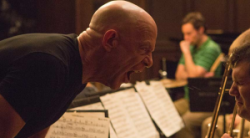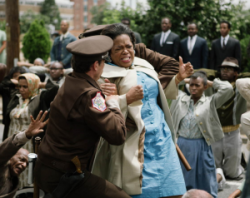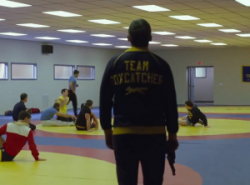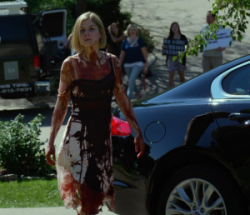The Agony and the Ecstasy of Distressing Cinema
It has long been an industry joke that actors wanting to win awards should portray debilitating illness, down and dirty ugliness or a fight against the Establishment.
Now that the BAFTA and Oscar nominations are out it’s possible to see whether these game plays have paid off. But another trend that is slowly emerging in this strange Teenies (what does follow the Noughties?) movie-going period is that the combined charms of sadness and threat are a fertile ground for new cinema.
To explain further, not long ago cinema was an agent of propaganda delivering fantasy and lack of enlightenment – a true form of escapism. We were taken into a world that wasn’t real, and we were happy. Then the 70s hit and the realism hinted at in the 60s became Box Office dynamite. Fast forward 40 years and a second wave has hit us. Nowadays filmmakers are obsessed with putting the harsh realities of life on the big screen, while we try not to flinch.
Starting with the obvious, Foxcatcher is a film so fraught with tension that you barely breathe for its 2 hour 13 minute running time. Bennett Miller has created a story that comes from near-history and blends ugly performances with a horror soundtrack creating a piece so taut and unyielding you could trampoline on the b-roll. The three central performances have about five minutes of humour between them before tragedy befalls one of them. The film’s central arena of wrestling is hyped up to a muscular level not seen in other sports movies. Miller know that terror does not need to be found solely in the horror genre and he is carving out a niche of highly tense sporting films. As I said here, it’s a breathtaking experience, but not a pleasant one.
Joining Foxcatcher in the 2015 nominations list is Whiplash. Director Damien Chazelle received the memo that we apparently want films that frighten the life out of us, with his tale of a jazz drummer brutalised by his over-zealous teacher. J K Simmons, a character actor with a list of screen credits to make your eyes water has never been so good (and more importantly, has never been so heart-palpitatingly shouty) as he is in this film. Chazelle turned a musical prodigy conceit on its head and blew our minds. Moving beyond genres, Chazelle has shown that the public and awarding bodies have an appetite for stressful, thrill-seeking movies, even about Julliard prodigies. Again, it’s not an easy watch.
Not all of this year’s contenders are outwardly stressful, yet beneath a calm and joyful veneer lurks a sinister heart. Richard Linklater’s epic Boyhood is one example. A film ostensibly about a young boy growing up in Texas across a 12 year period, it includes pretty harsh scenes of family discord which are difficult to watch. From domestic abuse and violence to shouting and arguing, even Linklater – a man whose movie back catalogue used to barely feature a note of distress (think School of Rock or Dazed and Confused) has changed somewhat. Just before Boyhood, came his brilliant Before Midnight, realistically playing out arguments between a warring couple, skewering the truth of long-term partnerships. Similarly,Into The Woods has very much taken the Grimm line on fairy tales, even with its many songs. It makes comment on the nature of trust and good versus evil, a conceit taken up in recent years by Maleficent,Snow White and the Huntsman and Alice in Wonderland. Take this one step further, away from Oscar contention and into what’s making money for the tweeny Teenies and we’re faced with The Hunger Games, Divergent and The Maze Runner – where fantasy is now a matter of life and death (that includes murdering others). None of these films leaves you with a smile on your face, more a sense of great relief.
The grand-daddy of the misery movement is definitely Steve McQueen. 2013-2014 saw 12 Years a Slave win many plaudits, but the film itself was horrible to endure. McQueen is also an award-winning modern artist, seeming to channel his cinematic stories through a medium of intense despair. I can’t say I have ever enjoyed his movies (Hunger and Shame, the latter which I left the cinema crying my eyes out) but I completely understand their brilliance and necessity. McQueen’s work in painful cinema has another virtue, which is that it helps to re-write historical wrongs – something that Stephen Spielberg has enjoyed in his modern period with pieces like Schindler’s List to Munich. The distress movement has made it possible for films like fellow Oscar nominee The Imitation Game to be made, and seen by large numbers. The treatment of Alan Turing was something that I knew only a little about until recently. Benedict Cumberbatch is an actor whose is loved for his challenging and grotesque characterisation and he delivers an excellent performance. The purpose of The Imitation Game is to remove the candy-coating and instead wring every drop of distress from its running time. I needed to go and lie down after the denouement.
So why is this happening? Firstly, the Academy now rewards distressing cinema, with 12 Years a Slave and its predecessor Argo winning the Best Picture Oscar (another film that put my heart in my mouth). Gone are the days where more palatable pieces like Chicago and Shakespeare in Love won big, with many of the winners from the last ten years being motivated by panic (The Hurt Locker and No Country For Old Men being two other recent examples).
Until recently, stress didn’t sell, but things are changing at the box office too. According toThe Numbers , another Awards hopeful –Gone Girl was the 17th highest grossing film of 2014 – quite impressive for an 18-rated film that is a non-stop heart stopping drama*. AndThe Babadook is bringing straightforward horror to the fore , with its first-class storytelling.
I’m not saying that people no longer go to the cinema for the enjoyment, more that there now seems to be a strict delineation in the purpose of certain movies. The growth of Marvel Studios would at first glance suggest that people want to see throwaway superhero cinema. However, their latest outings are becoming darker, if Captain America: The Winter Soldier is anything to go by. Guardians of the Galaxy was welcome relief – it seems that there is still desire to laugh and feel that Star Wars viewing experience (Guardians’ box office numbers were Galaxy-sized) and be purely entertained. I hold hope that comedic masterpiece Birdman is recognised this year, a welcome tonic to my distress, but I have to face the fact that this breed of films trading on heightened threat is here to stay.
*the second highest grossing film was Mockingjay Part 1 – a post-dystopic teen story that makes Harry Potter look like a walk in the park.













